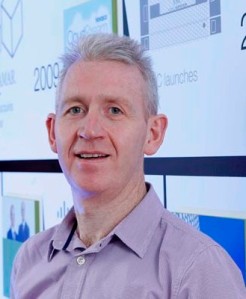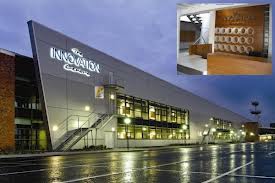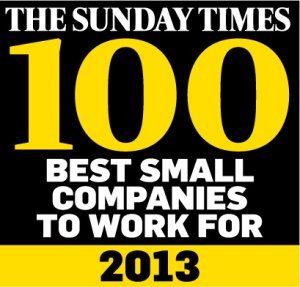 Gary: Patrick, just to get us started, just tell us a bit about Novosco.
Gary: Patrick, just to get us started, just tell us a bit about Novosco.
Patrick: Novosco is actually two Latin words joined together – Novus and Agnosco, which means “new understanding.” That was the idea, when we formed, back in 2007. What happened was John Lennon was running a company called 4Sol and I was running a company called Real Time Systems, and I approached him one day and said, “John, I think we could do more together than competing,” and so we did. That was just over six years ago. At that time, Gary, we had about 30 staff and a turnover of about £4.5m between the two companies. Over the last six years, based on the strong partnerships we have with our major partners like EMC and VMWare, and Citrix, we’ve grown significantly. This year to we’re hoping to do somewhere in the region of about £20m, with around about 90 staff between Belfast, Dublin, and Birmingham.
Gary: So what is it you actually do?
Patrick: I jokingly tell people well we don’t sell PCs and we don’t do websites, but we do a big lump of things in between! It’s what’s called systems integration. This is really the building blocks of IT. So first of all every IT system needs storage, that’s the foundation – a really a big part of it. We design and install storage systems on behalf of EMC in the UK and Ireland.
Then what you need on top of that is computing capability and we typically partner with Cisco for that. About three years ago Cisco brought out their own blade servers to compete head on with Dell and others. And then you need a virtualization layer and we work with VMware on that.
 So we work with each of these three organizations together, VMWare, Cisco and EMC – and also there is an organization joined called VCE that represents them, which provides a sort of Intel mainframe, which is referred to as a Vblock. So we sell the Vblock, but we also sell the individual components and do our own build, based on the three companies’ products.
So we work with each of these three organizations together, VMWare, Cisco and EMC – and also there is an organization joined called VCE that represents them, which provides a sort of Intel mainframe, which is referred to as a Vblock. So we sell the Vblock, but we also sell the individual components and do our own build, based on the three companies’ products.
So, partly in jest, but in all seriousness, we call it the plumbing of IT because the stuff we deal with is what you don’t see, but if it’s not there, you won’t get a response to your key strokes, your finance application won’t work, your e-mail won’t work, and so on.
It’s all about virtualization today. And what happens is when you start in the virtual world, you may have 100 physical servers, but then all of a sudden you go to 200 virtual servers because it’s so easy to create new environments, to just throw one up for testing a new application or whatever. So you get all this multiplicity of servers, and it’s very easy to create them and manage them.
If you remember the days when you needed a new physical server for something, it could have taken you weeks or months to get it up and running. It takes very little effort to provision a virtual server today. You go, “There’s the memory. There’s the storage I need. There’s how many virtual CPUs I need. Please create. Here’s the login.” It’s really very easy.
Gary: So are most of your customers larger organizations that consume a lot of computing power?
 Patrick: We have a lot like that. I mean, that is our sweet spot and many of our customers are in the NHS. We have worked with three Trusts here in Northern Ireland, but now that we’ve expanded into Great Britain, there is a lot of scope for us – there are about 500 Trusts in GB. We’re now doing business with about 12 of those, and they have huge requirements for hundreds of virtual servers.
Patrick: We have a lot like that. I mean, that is our sweet spot and many of our customers are in the NHS. We have worked with three Trusts here in Northern Ireland, but now that we’ve expanded into Great Britain, there is a lot of scope for us – there are about 500 Trusts in GB. We’re now doing business with about 12 of those, and they have huge requirements for hundreds of virtual servers.
But we also work with Local Government, Central Government, and Higher Education establishments – for example, we work with Queens in Belfast and Trinity College Dublin, as well as number of Universities in GB. We have around 40 customers in the NI Top 100 list including Moy Park, Tayto, Wrightbus, Foyle Food Group and Grafton.
We also have a lot of customers who, I suppose, have maybe got less of a requirement, but nevertheless their IT is critical to run their business. If an organization values its IT and wants to invest in it being properly managed and resourced, they’re a good fit for us. We work best with people who value their IT.
Gary: So, it’s just been in the last couple of years that you’ve made that leap across the water, after having been very successful here in Northern Ireland. So, tell us about that. How does a company from Northern Ireland make that sort of leap into a different, unknown geographic market?
Patrick: I think that’s a really good question Gary because, you know, when you’re thinking of doing that, it’s a bit scary. You have a geography which is right beside us, it’s got the same currency, it’s got a huge, massive opportunity, but how do you get into that market successfully in a managed, controlled way?
 So, we thought about the really strong, great culture we have in Novosco. We didn’t want to just go and hire people somewhere in England and say, “Would you now represent Novosco?” So what we did to see if any of our people based here wanted to expand their career and move to GB.
So, we thought about the really strong, great culture we have in Novosco. We didn’t want to just go and hire people somewhere in England and say, “Would you now represent Novosco?” So what we did to see if any of our people based here wanted to expand their career and move to GB.
Initially we got a senior salesperson and an engineer who wanted to relocate. So those two guys went, relocated over there, and started to help to build the business and recruit new engineers and new sales staff there.
But we also have some people here who are very senior pre-sales and account managers. They commute two to three days a week. So with people relocating, people commuting, and then hiring, I think we were able from the start to keep the core Novosco DNA and the ethos in our GB business. And we chose Birmingham because we didn’t want to be in the hotspots of Liverpool, Manchester or London. We didn’t see as many competitors in that area, so we put that down as our first location.
And it’s been great. We grew in our first year from 2011-2012 tenfold by turnover. And in 2012-2013 we think we’re going to double again. So that’s twenty times in the two years by turnover from when we started in 2011 till 2013. It’s been one of the best things that we’ve ever done. It was the right thing to do.
I suppose you always look back on it and go, “We should have done it earlier.” But we were going through an evolving business. We created a new stream of our business back in 2009 called Cloud Stream, which was all about cloud services and offering network connectivity and all that. So it took us a couple of years for it to get going and then the GB market was the next big thing for us. And we think that in the next two years we will become significantly bigger in GB and will have many more enterprise customers.
 But in the same way, we’ve doubled the size of our business this year in Dublin. We’ve gone from a €3-4m turnover to €7m this year. That’s been based on landing some really big customers in the EMC business area and in financial services.
But in the same way, we’ve doubled the size of our business this year in Dublin. We’ve gone from a €3-4m turnover to €7m this year. That’s been based on landing some really big customers in the EMC business area and in financial services.
Although we’re expanding into GB, having the business in Ireland is fundamental to us because all of our managed services and support is here. Novosco is going to continue being an indigenous company. We have great engineers here, but at the same time, we’ve created engineers who are happy to travel if needs be. So we intend to grow all three office locations.
Gary: Now you’ve mentioned the Cloud. There’s been a lot of talk about that and a bit of hype as well. What’s your experience out in the market; is that whole approach to computing being taken up by many organizations? What’s your experience been?
Patrick: I suppose I have a mixed opinion of it. It’s been the most overused, overhyped word for a long time in IT. It almost brings you back to the dot com bubble of early 2000s, where Cloud seems to be everything to everybody, and it becomes quite frustrating for people here in the IT field trying to sell solutions.
 Quite often the Cloud is presented as this new, cheaper way of doing things, and more often than not, it’s not a cheaper way of doing it! If you’re taking somebody’s IT from a broom cupboard and putting in that in a tier three data center, there’s no way that it’s ever going to be cheaper. But some people think you can just do that.
Quite often the Cloud is presented as this new, cheaper way of doing things, and more often than not, it’s not a cheaper way of doing it! If you’re taking somebody’s IT from a broom cupboard and putting in that in a tier three data center, there’s no way that it’s ever going to be cheaper. But some people think you can just do that.
What the Cloud does is it allows you to move from IT systems on your own premises to probably a much more mature model where the IT is being hosted by somebody. And if you think of what these large scale data centres are like, the investment that goes in, some of these data centers are worth tens of millions of pounds. And they’ve got back-up UPS, they’ve got back-up diesel generators, they’ve got 24/7 security, they’ve got CCTV everywhere, you’re not allowed in unless you’re escorted, you’ve got card controls. That’s just a massive step up from what you would have typically had with your own IT.
But there are huge benefits to it – if I was in an SME business in Northern Ireland today and I was thinking, could I protect myself, my IT, by having a data centre that’s got all those capabilities? That would make sense from a business continuity or insurance or an auditor’s view of the world. So I think it’s definitely a leap forward, but people shouldn’t get confused that it’s a cheap way of getting your IT because quite often it’s not.
Gary: And the other technology that is important in terms of what you do, presumably, is big data – another hyped term. You hear all these statistics about the growth of data in the world over the last few years. And so, big data is much touted, much hyped. You’re in the storage business, so presumably, you’re seeing what’s really happening on the ground. What’s your view on all that?
Patrick: Here in Northern Ireland we don’t have many requirements for big data. But is it more common elsewhere? Absolutely.
 I was recently talking about this at the Sales Institute in Dublin, with another colleague from EMC. And in the presentation I was saying that there’s somewhere around a few billion sensors that are collecting data on a 24/7 basis – and when I talk about sensors, I’m talking about, for example, chips now going into cars which will collect every single location that car ever was in, plus what speed it was doing and so on. And this sort of data helps insurance companies figure out, for example, whether this 17 or 18 year old was actually driving in a pattern that we’re happy about an as insurance risk. If every car ends up with that and every insurance company is using that as a tool to ask “what’s the median, what’s the average, what’s the worst case here,” they can start to make business decisions about their business and whether it’s a good risk to renew that person for the following year.
I was recently talking about this at the Sales Institute in Dublin, with another colleague from EMC. And in the presentation I was saying that there’s somewhere around a few billion sensors that are collecting data on a 24/7 basis – and when I talk about sensors, I’m talking about, for example, chips now going into cars which will collect every single location that car ever was in, plus what speed it was doing and so on. And this sort of data helps insurance companies figure out, for example, whether this 17 or 18 year old was actually driving in a pattern that we’re happy about an as insurance risk. If every car ends up with that and every insurance company is using that as a tool to ask “what’s the median, what’s the average, what’s the worst case here,” they can start to make business decisions about their business and whether it’s a good risk to renew that person for the following year.
And other examples that we’re seeing is that there’s far more video being collected than ever before. You go into the City centre, you’re caught in 40 or 50 CCTV cameras every couple of minutes. Then the medical field is huge. I mean, if you think of all the images that are being captured and the amount of data that’s being held on a person, be it images, be it all the medication and drugs you’ve ever had in your life, be it anything that you’ve ever suffered from. All of this is now being put into larger data sets and it can be used to help make better decisions.
The big examples that you see globally for data are with Twitter and Facebook, where you get tens of millions of transactions in minutes.
The data growth at the moment for an average organization is about 50 percent per year, but once they start to make use of these sensors and more data collection, that’s going to increase significantly. And before long people are going to think that Terabyte is out of date, and Petabyte and Exabyte will be much more commonly used. We’ll have that amount of storage even in our own homes.
Gary: All of which is good news for –
Patrick: A storage company!
Gary: A company like yours!
Patrick: Absolutely. This explosion of data is great news for people like us who in a position to be able to provide customers with a solution to their increasing storage requirements.
Gary: Patrick, as you look around the rest of the IT industry here in Northern Ireland – are you encouraged at what’s happening here and at the growth of the sector and the degree of innovation and the growth of companies? What’s your view as you look around?
Patrick: I’ve never been more optimistic about the future for us at Novosco, but also for the whole sector in Northern Ireland. I mean, look at some of the things that have happened recently – the recent digital summit in Stormont and some of the forecasts that have been made in terms of the number of jobs being created.
 There’s over a hundred technology companies in this location here in the Science Park area. Five years ago, you wouldn’t have dreamt you would have that scale, and this seems to be only the start of it. Quite often I talk to students about careers in ICT. I say to them this is a great time to be seriously considering a career in IT, because the salaries are on the increase, the opportunities are there, and no matter what skills you develop, you can carry them with you – you can go to any other country in the world and use them, and so it’s a fantastic time.
There’s over a hundred technology companies in this location here in the Science Park area. Five years ago, you wouldn’t have dreamt you would have that scale, and this seems to be only the start of it. Quite often I talk to students about careers in ICT. I say to them this is a great time to be seriously considering a career in IT, because the salaries are on the increase, the opportunities are there, and no matter what skills you develop, you can carry them with you – you can go to any other country in the world and use them, and so it’s a fantastic time.
I think we will continue to see growth. There are great examples of brilliant organizations and companies in the Science Park and all over Belfast and Northern Ireland. And there’s no reason why these companies can’t expand internationally, globally. If you’re hiring the right people, if you’re growing and developing the skills of your people, then you can become an international business.
For a software company starting in Northern Ireland, I think their first thing should be to go international. They need to get outside of Northern Ireland and get that market coverage because our population isn’t big enough to create the success.
And I think there’s a willingness on the part of senior people within the IT sector to be help the smaller companies by peer meetings and reviews, and encouragement, and doing whatever we can. I regularly meet with people from software companies here in the Science Park and if there’s any opportunity for us to partner with them, we will definitely do it. Or if we find out some market knowledge, I’ll pass it on.
Gary: So what do you think are the major challenges facing IT companies here? Is it – particularly the smaller, indigenous ones – is it people, is it sales and marketing, is it innovation? What do you think are the main challenges?
 Patrick: I would say there is always the challenge of getting the right people. We have been fortunate that we have been able to hire some of the best engineers in the country, and that’s great, and that’s helped develop our business. And, to get to the next level, of course, you need to develop the people you’ve got. But actually finding new, really, really great salespeople is one thing that we always find a challenge.
Patrick: I would say there is always the challenge of getting the right people. We have been fortunate that we have been able to hire some of the best engineers in the country, and that’s great, and that’s helped develop our business. And, to get to the next level, of course, you need to develop the people you’ve got. But actually finding new, really, really great salespeople is one thing that we always find a challenge.
The sales team we have here in Novosco is fantastic because they are all technically capable, so that when we go to a presentation or a meeting, they can answer 90% of the questions – they don’t have to go consult with a pre-sales engineer.
And finding new people who are capable of doing that is quite hard. In Northern Ireland, although we’re not naturally born salespeople, we can become really good salespeople. But there’s still a wee bit of this – you know, whenever you talk to somebody who is younger and ask them if they would consider becoming a salesperson when they graduate – it’s like, “What?” But the fact is that salespeople can be the most rewarded people in the industry.
So for me, if you are an IT graduate and you’ve got a few years technical experience, a great transition is to move into the sales area. This can be a real limiting factor for some companies – not having really strong technical salespeople.
 What else is limiting? I suppose for many start-up companies funding can be a bit of a drawback. In Northern Ireland, we maybe don’t have as many ways to get hold of funding.
What else is limiting? I suppose for many start-up companies funding can be a bit of a drawback. In Northern Ireland, we maybe don’t have as many ways to get hold of funding.
But if you look at some of the recent initiatives and you look at what NISP are doing and you look at what other VC companies and funding organizations are doing, it’s definitely getting better. But we need to have a bigger choice. So funding and people are both challenges.
And also I think sometimes we are limited by our own aspirations. I think sometimes we’re maybe a wee bit too grounded, you know, we need to dream a bit more. We should have far more publicly listed organizations coming out of Northern Ireland which could create a thousand or 2,000 or 5,000 jobs. That’s what we need – more companies like that.
Look at First Derivatives, look at Andor, look at Almac – we want people, organizations, like that who can consume huge amounts of graduates, and be able to give them great careers. So it would be great to see more of that happening and more dreamers, more people who’ve got massive aspirations for growing their businesses.
Gary: You’ve obviously got some of that for sure. How do you communicate that vision and make sure everybody in your organization buys into it?
Patrick: It’s actually a really good question, Gary, because it’s something that at board meetings recently we’ve been talking about – and it’s about our culture. So part of our culture here is to be very, very open, and one of the things we did recently was to get our staff to participate in what’s called the Sunday Times’ Best Small Companies to Work For.
 And everybody gets surveyed in lots of different areas, and they come back and say, “here’s the things that we really like and here’s some of the things that we think you could do better.” And one of those was about communicating the overall strategy to our people. So we’ve really focused on that. What we do now is have quarterly company meetings where we stand up and give the previous quarter’s figures and share with everybody where we’re doing well and where we’re profitable. We talk about all the HR initiatives in the company.
And everybody gets surveyed in lots of different areas, and they come back and say, “here’s the things that we really like and here’s some of the things that we think you could do better.” And one of those was about communicating the overall strategy to our people. So we’ve really focused on that. What we do now is have quarterly company meetings where we stand up and give the previous quarter’s figures and share with everybody where we’re doing well and where we’re profitable. We talk about all the HR initiatives in the company.
And we try to go the extra mile with our staff. We provide fruit twice a week in the office, so if anybody hasn’t brought their lunch in, they can go and grab whatever they want. We have good quality coffee on tap permanently. We actually have free massages every Friday, so if you come in here on a Friday morning, you get a 20 minute session, you just book it and away you go!
We also have a well-being campaign – recently we said we wanted all the employees to help us run 60 kilometers on a treadmill and we’d give whatever money we raise that day to bowel cancer UK, which is one of our sponsor charities.
We actually had 30 people who either got on and ran or who just did a few kilometers walk. And we managed to raise £2,000 for Bowel Cancer UK. So we focus on well-being, we focus on communication. We want everybody to be bought into the culture and the ethos of the business. And I think the main point out of all of it is we never stop looking to improve. It’s always about not resting on your laurels, rather, thinking about what’s the next thing that we should be obsessing about?

